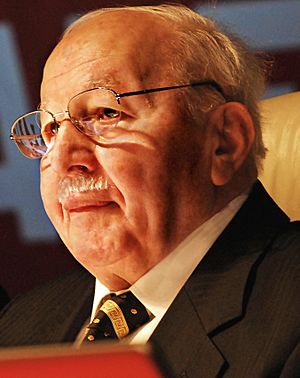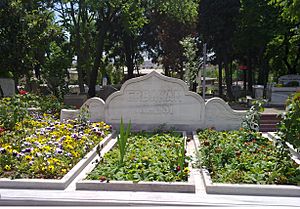Necmettin Erbakan facts for kids
Quick facts for kids
Necmettin Erbakan
|
|
|---|---|
 |
|
| 23rd Prime Minister of Turkey | |
| In office 28 June 1996 – 30 June 1997 |
|
| President | Süleyman Demirel |
| Deputy | Tansu Çiller |
| Preceded by | Mesut Yılmaz |
| Succeeded by | Mesut Yılmaz |
| Deputy Prime Minister of Turkey | |
| In office 21 July 1977 – 5 January 1978 serving alongside Alparslan Türkeş |
|
| Prime Minister | Süleyman Demirel |
| Preceded by | Orhan Eyüboğlu |
| Succeeded by | Orhan Eyüboğlu |
| In office 31 March 1975 – 21 June 1977 serving alongside Turhan Feyzioğlu and Alparslan Türkeş |
|
| Prime Minister | Süleyman Demirel |
| Preceded by | Zeyyat Baykara |
| Succeeded by | Orhan Eyüboğlu |
| In office 26 January 1974 – 17 November 1974 |
|
| Prime Minister | Bülent Ecevit |
| Preceded by | Sadi Koçaş |
| Succeeded by | Zeyyat Baykara |
| Leader of the Felicity Party | |
| In office 17 October 2010 – 27 February 2011 |
|
| Preceded by | Numan Kurtulmuş |
| Succeeded by | Mustafa Kamalak |
| In office 11 May 2003 – 30 January 2004 |
|
| Preceded by | Recai Kutan |
| Succeeded by | Recai Kutan |
| Leader of the Welfare Party | |
| In office 11 October 1987 – 19 January 1998 |
|
| Preceded by | Ahmet Tekdal |
| Succeeded by | Party abolished |
| Leader of the National Salvation Party | |
| In office 20 October 1973 – 12 September 1980 |
|
| Preceded by | Süleyman Arif Emre |
| Succeeded by | Party abolished |
| Leader of the National Order Party | |
| In office 26 January 1970 – 20 May 1971 |
|
| Preceded by | Party established |
| Succeeded by | Party abolished (Süleyman Arif Emre as leader of the National Salvation Party) |
| Member of the Grand National Assembly | |
| In office 6 November 1991 – 22 February 1998 |
|
| Constituency | Konya (1991, 1995) |
| In office 12 October 1969 – 12 September 1980 |
|
| Constituency | Konya (1969, 1973, 1977) |
| Personal details | |
| Born | 29 October 1926 Sinop, Turkey |
| Died | 27 February 2011 (aged 84) Çankaya, Ankara, Turkey |
| Political party | National Order Party (1970–71) National Salvation Party (1972–1981) Welfare Party (1987–1998) Virtue Party (1998–2001) Felicity Party (2003–2011) |
| Spouse | Nermin Erbakan (m. 1967–2005, her death) |
| Children | Zeynep, Elif, Fatih |
| Alma mater | Istanbul High School Istanbul Technical University RWTH Aachen University |
| Signature | |
Necmettin Erbakan (born October 29, 1926 – died February 27, 2011) was an important Turkish politician, engineer, and professor. He served as the Prime Minister of Turkey from 1996 to 1997. He was known for his political ideas, called Millî Görüş, which means "National View." This idea focused on Turkey developing its own strengths and values, while also building stronger ties with Muslim countries.
Erbakan founded and led several political parties in Turkey. These parties aimed to bring religious values into politics. He was a key figure in Turkish politics for many decades.
Contents
Early Life and Education
Necmettin Erbakan was born in Sinop, a city on the Black Sea coast in northern Turkey. His father, Mehmet Sabri, was a judge. His mother, Kamer, was from a well-known family in Sinop.
He went to Istanbul High School. Then, he studied mechanical engineering at the Istanbul Technical University, graduating in 1948. He earned a PhD in mechanical engineering from RWTH Aachen University in Germany. After returning to Turkey, Erbakan became a lecturer at Istanbul Technical University. He was made a professor there in 1965. Later, he worked in important roles in industry before entering politics. In 1969, he was elected as a representative for Konya.
Political Journey
Erbakan's main political idea was explained in a book he wrote in 1969 called Millî Görüş (National View). The organization he founded with the same name believes in unity among different religions.
For many years, Erbakan was a leading figure in Turkish politics. He led several political parties that focused on Islamic values. These parties often became popular but were sometimes closed down by Turkey's government, which supports a separation of religion and state.
In the 1970s, Erbakan was the leader of the National Salvation Party. This party even joined a government with the Republican People's Party during the Cyprus crisis in 1974.
After a military takeover in 1980, Erbakan and his party were banned from politics. He returned to politics in 1987 after a public vote allowed him to. He then became the leader of the Welfare Party. This party gained a lot of support in the 1990s and won the general elections in 1995.
Becoming Prime Minister
In 1996, Necmettin Erbakan became the Prime Minister of Turkey. He formed a government with another party, the Right Path Party. As Prime Minister, he tried to improve Turkey's relationships with Arab countries. His government also aimed to boost the economy and help Turkish citizens.
Erbakan's foreign policy received some criticism. For example, during a trip to African countries like Egypt, Nigeria, and Libya, he met with the Libyan leader, Muammer Gaddafi. Gaddafi openly criticized Turkey's policies, which caused some embarrassment for Erbakan back home.
Despite these reactions, Erbakan continued to focus on his "National View" ideas. He suggested creating an Islamic security group to compete with NATO. He also proposed an Islamic currency called the dinar. These ideas worried the military, which began to monitor his party's activities.
The military increased its warnings to Erbakan's government. This led Erbakan to step down as Prime Minister in 1997. There was an agreement for him to serve for a certain time and then let his partner, Tansu Çiller, take over. However, when Erbakan stepped down, the President asked another party leader, Mesut Yılmaz, to form the new government instead.
After Being Prime Minister
After Erbakan left office, his party, the Welfare Party, was closed down by the courts. The courts said the party was trying to promote religious rule in the country. Erbakan was again banned from active politics. He believed that a truly democratic country should not ban political parties for their beliefs.
Even when he was banned from politics, Erbakan continued to guide former members of his party. Some of these members went on to form the Virtue Party in 1997. One of them was Recep Tayyip Erdoğan, who later became the President of Turkey. The Virtue Party was also closed down in 2001. By then, Erbakan's ban had ended. He then founded the Felicity Party, leading it from 2003 to 2004 and again from 2010 until his death.
Passing Away
Necmettin Erbakan passed away on February 27, 2011, at 11:40 AM due to heart failure. He died at Güven Hospital in Çankaya, Ankara.
His body was taken to Istanbul. After a religious funeral service at the Fatih Mosque, many people followed his coffin to the Merkezefendi Cemetery. He was buried next to his wife, Nermin. Erbakan did not want a state funeral, but many high-ranking government officials attended his funeral.
The Economist newspaper noted that Erbakan was seen as someone who helped moderate Islamic political views in Turkey. He also made Turkey a possible example for other countries in the Arab world.
His Main Ideas
Erbakan's foreign policy had two main goals: to unite Muslim countries (called Pan-Islamism) and to oppose Zionism. He created a group called "D-8" or The Developing Eight. This group aimed for economic and political cooperation among Muslim countries. Its eight members include Turkey, Iran, Malaysia, Indonesia, Egypt, Bangladesh, Pakistan, and Nigeria.
Erbakan also had a friendship with Jean-Marie Le Pen. They shared a belief that Christian and Islamic cultures were not compatible. They also had similar right-wing nationalist ideas.
See Also
 In Spanish: Necmettin Erbakan para niños
In Spanish: Necmettin Erbakan para niños
 | Sharif Bey |
 | Hale Woodruff |
 | Richmond Barthé |
 | Purvis Young |


